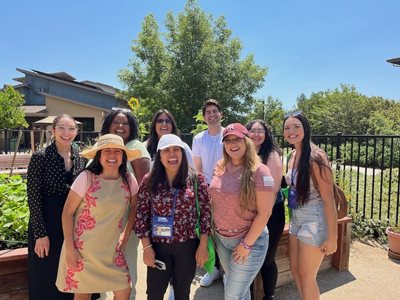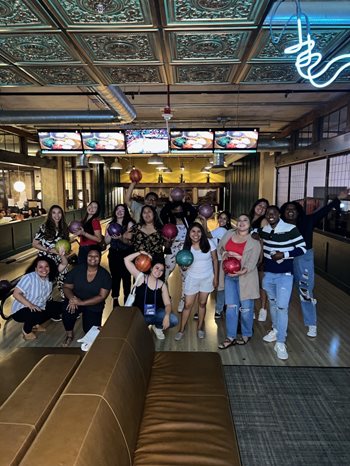From a young age, Monica Arceo Mendoza was aware of a lack of decent, affordable housing. "My family still struggles with housing insecurity today and it is an issue that is not unique to our family," she says. Her experience led her to California Coalition of Rural Housing’s (CCRH) Internship Program for Diversity in Nonprofit Housing and Community Development. The program trains a dozen college seniors a year and places them at housing and community development organizations.
 For more than a decade, NeighborWorks America has helped support the internship program, now in its 20th year. NeighborWorks network organizations in California, Washington and Oregon also serve as "host" organizations for interns. Arceo Mendoza, for instance, interns with NeighborWorks Umpqua, focusing on development and financial planning. "This program has fueled my passion for affordable housing," she says. "I am determined to remain in the field whether that role would be in development, advocacy, or design."
For more than a decade, NeighborWorks America has helped support the internship program, now in its 20th year. NeighborWorks network organizations in California, Washington and Oregon also serve as "host" organizations for interns. Arceo Mendoza, for instance, interns with NeighborWorks Umpqua, focusing on development and financial planning. "This program has fueled my passion for affordable housing," she says. "I am determined to remain in the field whether that role would be in development, advocacy, or design."
Many of the program interns have experienced housing insecurity and encountered the benefits of nonprofits first-hand, shares Gisela Salgado, CCRH’s Leadership Development Program Director. A program graduate, Salgado grew up in Section 8 housing. "We share that lived experience," she says. "It's something that resonates with our own personal values and impacts the communities we come from."
To date, more than 200 students have gone through the internship program to learn about a range of developments from the building side, including single-family homes, multifamily homes and manufactured housing. "They learn about project management," Salgado says.
When students complete the yearlong program, about 50% move to full-time positions with the nonprofits, including NeighborWorks nonprofits, Salgado says. “Others may venture to asset management or social services, and some have gone to government positions or housing authorities.”
From the start, the goal has been to create more leaders, particularly leaders of color, in community development in rural areas, which aligns with NeighborWorks' goals to support leadership diversity. "We want to create a pipeline of success stories – people who will eventually become executive directors," Salgado says.
"Leaders of color are underrepresented in housing and community development – and more so in rural areas," says Elena Kaye-Schiess, NeighborWorks program manager, Rural Initiatives. Insights from the program prompted NeighborWorks to develop a training course on building pipelines of leaders of color in rural communities. "Seeing the success of this program showed us the need to do even more at a national level." The training was offered for the first time at the Los Angeles NeighborWorks Training Institute in May, and will be offered at future institutes as well.
areas," says Elena Kaye-Schiess, NeighborWorks program manager, Rural Initiatives. Insights from the program prompted NeighborWorks to develop a training course on building pipelines of leaders of color in rural communities. "Seeing the success of this program showed us the need to do even more at a national level." The training was offered for the first time at the Los Angeles NeighborWorks Training Institute in May, and will be offered at future institutes as well.
Vanessa Guerra, who interned in 2008, says the program was lifechanging. She spent her year working on the rehabilitation of a mobile home park, then began working full time for Mutual Housing. "It gave me the chance to provide housing to people facing some of the same struggles I went through growing up -- specifically farm workers," she says. She now serves as associate director of housing development. "It helped me find a profession that is meaningful," Guerra says of the program.
Salgado says CCRH hopes to increase the numbers of those going on to leadership positions even more by creating support for mid-career professionals. Having a diverse workforce and creating an environment of inclusivity is key, she adds.
Interested in learning more about creating a diverse workforce? A NeighborWorks America symposium, Investing in Our Teams: Creating a Representative and Resilient Workforce, is scheduled for Aug. 17.
07/31/2022

